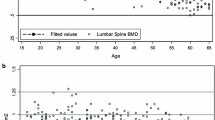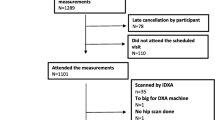Abstract
There are few data concerning the occurrence of peak bone mass in women of South Asian origin. The aim of this study was to determine the level of peak bone mass in South Asian women in the UK and to determine whether any observed differences could be explained by differences in body size. Two groups of South Asian women, those of (1) Pakistani Muslim and (2) Gujarati Hindu origin, together with a European group aged 18 to 36 years, were recruited from primary-care population age-sex registers in the Greater Manchester area. They were invited to attend for a detailed interview-assisted lifestyle questionnaire and assessment of height and weight. Bone mass density (BMD) at the hip and lumbar spine was measured by dual energy X-ray absorptiometry (DEXA) scan (Hologic QDR 4500). Volumetric bone density was measured at the distal radius using pQCT (Norland Stratec XCT 2000). Linear regression was used to determine whether any observed differences in the level of bone mass could be explained by differences in body size. A total of 119 European women with a mean age of 30.4 years, 98 Pakistani Muslim women with a mean age of 29.2 years and 20 Gujarati Hindu women with a mean age of 29.2 years had bone density measurements performed. The Europeans were taller and heavier than either South Asian group. Peak BMD was greater among the European than the Pakistani women at all three measuring sites, with the Gujarati women having intermediate values at the hip and lumbar spine. Observed differences disappeared, however, after adjusting for height and weight. There were no differences in volumetric density at the lumbar spine or distal radius between the groups. In summary, there are differences in the level of bone mass between European and South Asian women, though these can be explained by differences in bone size, height or weight.

Similar content being viewed by others
References
Marshall D, Johnell O, Wedel H (1996) Meta-analysis of how well measures of bone mineral density predict occurrence of osteoporotic fractures. BMJ 312:1254–1259
Hui SL, Slemenda CW, Johnston CC Jr (1990) The contribution of bone loss to postmenopausal osteoporosis. Osteoporos Int 1:30–34
Kanis JA (1996) Textbook of osteoporosis. Blackwell Science, Oxford
Aloia JF, Vaswani A, Yeh JK, Flaster E (1996) Risk for osteoporosis in black women. Calcif Tissue Int 59:415–423
Bachrach LK, Hastie T, Wang MC, Narasimhan B, Marcus R (1999) Bone mineral acquisition in healthy Asian, Hispanic, black, and Caucasian youth: a longitudinal study. J Clin Endocrinol Metab 84:4702–4712
Cundy T, Cornish J, Evans MC, Gamble G, Stapleton J, Reid IR (1995) Sources of interracial variation in bone mineral density. J Bone Miner Res 10:368–373
Marquez MA, Melton LJ III, Muhs JM, Crowson CS, Tosomeen A, O’Connor MK et al (2001) Bone density in an immigrant population from Southeast Asia. Osteoporos Int 12:595–604
Stephens WP, Klimiuk PS, Warrington S, Taylor JL, Berry JL, Mawer EB (1982) Observations on the natural history of vitamin D deficiency amongst Asian immigrants. Q J Med 51:171–188
Stephens WP, Klimiuk PS, Warrington S, Taylor JL (1982) Observations on the dietary practices of Asians in the United Kingdom. Hum Nutr Appl Nutr 36:438–444
Rashid A, Mohammed T, Stephens WP, Warrington S, Berry JL, Mawer EB (1983) Vitamin D state of Asians living in Pakistan. BMJ (Clin Res Ed) 286:182–184
Wharton PA, Eaton PM, Wharton BA (1984) Subethnic variation in the diets of Moslem, Sikh and Hindu pregnant women at Sorrento Maternity Hospital, Birmingham. Br J Nutr 52:469–476
Abraham R, Brown, MC, North WR, McFadyen IR (1987) Diets of Asian pregnant women in Harrow: iron and vitamins. Hum Nutr Appl Nutr 41:164–173
Solanki T, Hyatt RH, Kemm JR, Hughes EA, Cowan RA (1995) Are elderly Asians in Britain at a high risk of vitamin D deficiency and osteomalacia? Age Ageing 24:103–107
Wardle J, Wrightson K, Gibson L (1996) Body fat distribution in South Asian women and children. Int J Obes Relat Metab Disord 20:267–271
Primatesta P, Hirani V (2001) Anthropometry. In: Erens B, Primatesta P, Prior G (eds) Health survey for England. The health of minority groups ‘99. HMSO, London, pp 143–173
Bhopal R, Unwin N, White M, Yallop J, Walker L, Alberti KG, Harland J, Patel S, Ahmad N, Turner C, Watson B, Kaur D, Kulkarni A, Laker M, Tavridou A (1999) Heterogeneity of coronary heart disease risk factors in Indian, Pakistani, Bangladeshi and European origin populations: cross-sectional study. BMJ 319:215–220
Riste L, Khan F, Cruickshank K. (2001) High prevalence of type 2 diabetes in all ethnic groups, including Europeans, in a British inner city: relative poverty, history, inactivity, or 21st century Europe? Diabetes Care 24:1377–1383
Williams R, Shams M (1998) Generational continuity and change in British Asian health and health behaviour. J Epidemiol Community Health 52:558–563
Hamson C, Goh L, Sheldon P, Samanta A (2003) Comparative study of bone mineral density, calcium, and vitamin D status in the Gujarati and white populations of Leicester. Postgrad Med J 79:279–283
Armes F, Rajaratnam G (1998) The difference in normal ranges of bone mineral density in white European women and women with ethnic origins in the Indian subcontinent. In: Ring EFJ, Elvins DM, Bhalla AK (eds) Current research in osteoporosis and bone mineral measurement V. British Institute of Radiology, London, p 38
Alekel DL, Peterson CT, Werner RK, Mortillaro E, Ahmed N, Kukreja SC (2002) Frame size, ethnicity, lifestyle, and biologic contributors to areal and volumetric lumbar spine bone mineral density in Indian/Pakistani and American Caucasian premenopausal women. J Clin Densitom 5:175–186
Carter DR, Bouxesin ML, Marcus R (1992) New approaches for interpreting projected bone densitometry data. J Bone Miner Res 7:137–145
Bradford Health Authority. Nam Pehchan Computer Software (1996) New Mill, Victoria Road, Saltaire, Shipley BD18 3LD. Computer Services, City of Bradford Metropolitan Council (Dept 13), Britannia House, Bradford BD1 1HX
Bowling A, Hart D, Silman A (1989) Accuracy of electoral registers and family practitioner committee lists for population studies of the very elderly. J Epidemiol Community Health 43:391–394
Edwards P, Roberts I, Clarke M, DiGuiseppi C, Pratap S, Wentz R et al (2002) Increasing response rates to postal questionnaires: systematic review. BMJ 324:1183–1191
Erens B, Primatesta P, Prior G (2001) Health survey for England. The health of minority groups ‘99. HMSO, London
Tobias JH, Cook DG, Chambers TJ, Dalzell N (1994) A comparison of bone mineral density between Caucasian, Asian and Afro-Caribbean women. Clin Sci 87:587–591
Alekel DL, Mortillaro E, Hussain EA, West B, Ahmed N, Peterson CT et al (1999) Lifestyle and biologic contributors to proximal femur bone mineral density and hip axis length in two distinct ethnic groups of premenopausal women. Osteoporos Int 9:327–338
Reddy PG, Mithal A, Rao D (2002) Bone mineral density in healthy Asian Indian women: development of a reference database and implications for diagnosis of osteoporosis in Indian women living in the United States. J Bone Miner Res 17 [Suppl 1]:S258
Patel DN, Pettifor JM, Becker PJ (1993) The effect of ethnicity on appendicular bone mass in white, coloured and Indian schoolchildren. S Afr Med J 83:847–853
Falch JA, Steihaug S (2000) Vitamin D deficiency in Pakistani premenopausal women living in Norway is not associated with evidence of reduced skeletal strength. Scand J Clin Lab Invest 60:103–109
Shaunak S, Colston K, Ang L, Patel SP, Maxwell JD (1985) Vitamin D deficiency in adult British Hindu Asians: a family disorder. BMJ (Clin Res Ed) 291:1166–1168
Finch PJ, Ang L, Eastwood JB, Maxwell JD (1992) Clinical and histological spectrum of osteomalacia among Asians in south London. Q J Med 83:439–448
Iqbal SJ, Garrick DP, Howl A (1994) Evidence of continuing “deprivational” vitamin D deficiency in Asians in the UK. J Hum Nutr Diet 7:47–52
Calder SJ, Anderson GH, Harper WM, Gregg PJ (1994) Ethnic variation in epidemiology and rehabilitation of hip fracture. BMJ 309:1124–1125
Author information
Authors and Affiliations
Corresponding author
Rights and permissions
About this article
Cite this article
Roy, D., Swarbrick, C., King, Y. et al. Differences in peak bone mass in women of European and South Asian origin can be explained by differences in body size. Osteoporos Int 16, 1254–1262 (2005). https://doi.org/10.1007/s00198-005-1837-0
Received:
Accepted:
Published:
Issue Date:
DOI: https://doi.org/10.1007/s00198-005-1837-0




